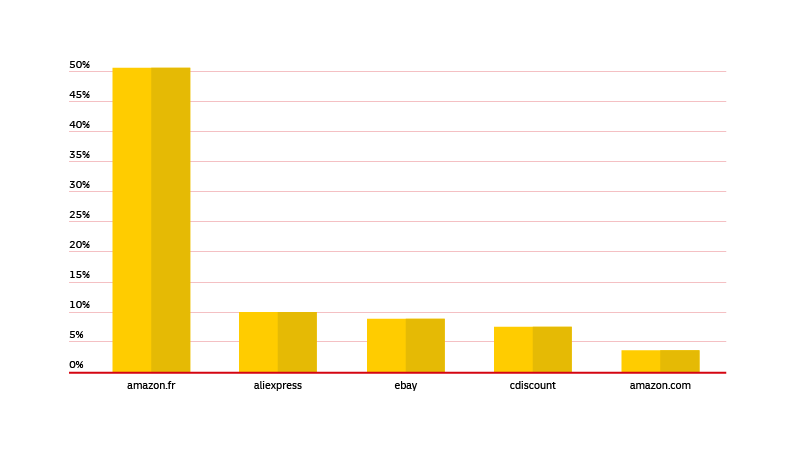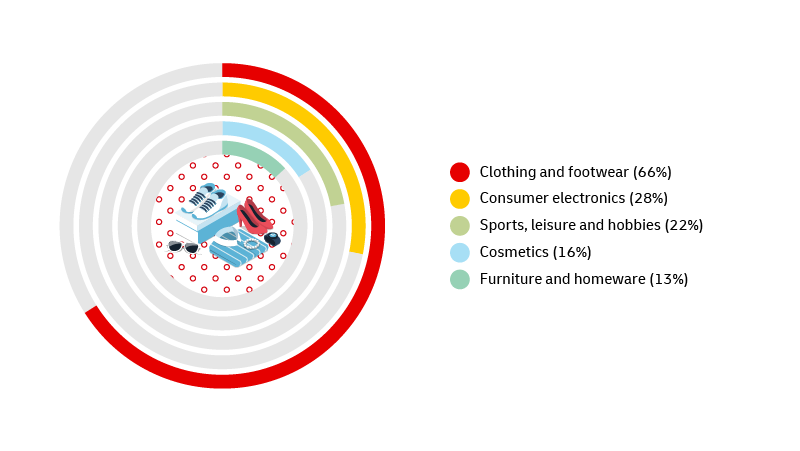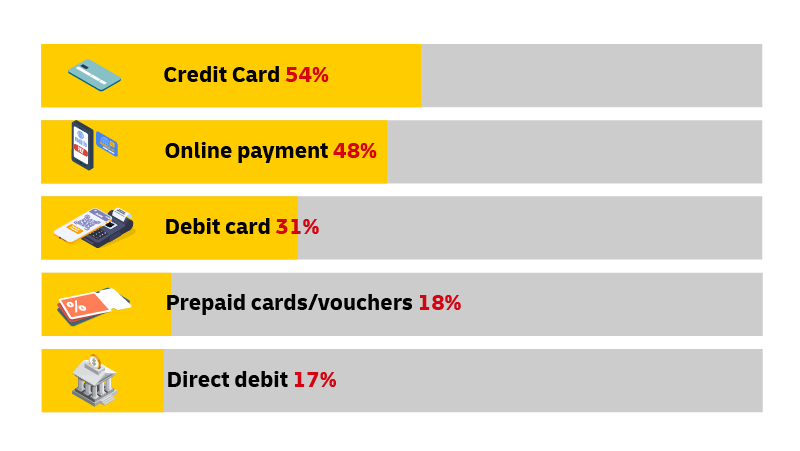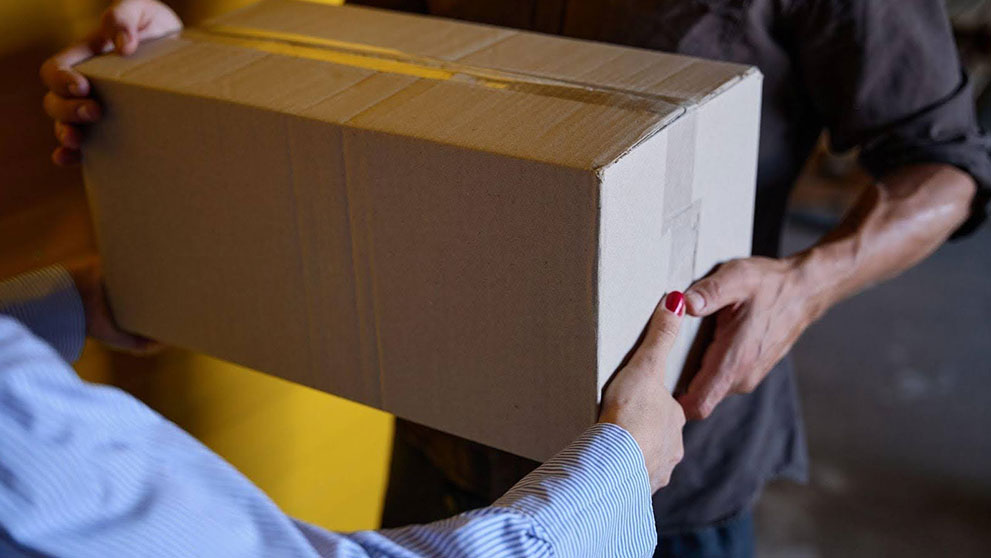Is France on your export radar yet? It’s one of Europe’s e-commerce heavyweights – sitting behind only Germany and the UK in terms of numbers of users1. In fact, in 2022, more than 8 out of 10 French internet users bought something online2.
Interested yet? All you need is an international shipping partner and some local market knowledge and your business will be good to go! Read on as we explore the consumer insights and customs knowledge you need to export to France.
MARKET OVERVIEW

+14% e-commerce rise in one year
Between 2021 and 2022, online sales revenue in France grew from 129 billion euros to 146.9 billion(3).

A rising e-commerce penetration rate
France has a population of 64.8 million(4), and over 28.1 million e-commerce users(5). This is forecast to grow to 32.7m by 2026.
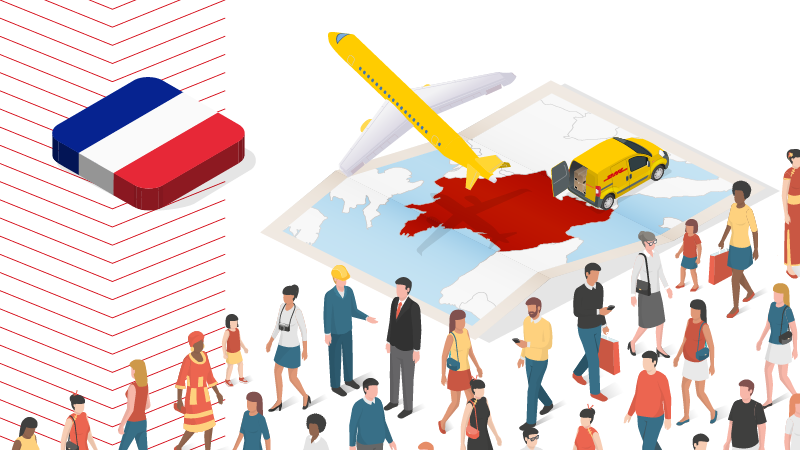
Fuelled by young buyers
In 2022, nearly nine out of 10 French consumers aged 25 to 29 years old shopped online(6).
DOING BUSINESS IN FRANCE: CONSUMER TRENDS
Where do consumers in France shop online?
Online marketplaces can be a helpful gateway for cross-border businesses wishing to sell to a new country for the first time.
What are they buying from cross-border brands?
In 2022, around two-thirds of French online shoppers reported buying clothes and footwear from abroad. In comparison, only 13% of online shoppers bought furniture and homeware from cross-border retailers.
How do French consumers like to pay for their online purchases?
Most popular payment methods in France in 20239
France’s biggest shopping events
Understanding the key shopping events and holidays in France is crucial for maximizing your e-commerce sales. Here are some important dates to mark in your calendar:
- Valentine's Day, February 14: Ahead of the most romantic day of the year, expect buyers through your online doors searching for a special something for their sweetheart.
- Mother’s Day, May 26: A great opportunity to increase your e-commerce sales, Mother's Day is always celebrated on the last Sunday of May, unless it coincides with Pentecost.
- Father's Day, June 16: The Dads get a day too! Consider creating a gift guide to give shoppers inspiration on what to buy their Fathers.
- Amazon Prime Day, July: France joins countless other countries in participating in this two-day sales bonanza. Sellers on the e-commerce marketplace should offer significant discounts to attract bargain hunters.
- Black Friday, November 29: Originating in America, Black Friday has now evolved into a global phenomenon. Competition is fierce, so shout about your best deals on all your social media channels.
- Cyber Monday, December 2: Wrapping up the Black Friday weekend is Cyber Monday, a chance for your business to make some final sales.
- Christmas, December 25: December entails a flurry of festive shoppers looking for the perfect gifts for their loved ones. Offering express shipping will help your business win some last-minute shoppers, too.
Customs and import regulations for exporting to France

Customs duties are payable from €150 of value Since July 1, 2021, VAT has applied to all goods imported into France from non-EU countries.
As a member of the European Union (EU), France follows EU trade policies, which generally involve low or no tariffs for goods originating from other EU member states. However, import tax may still apply to goods imported from outside the EU. The specific rates and regulations vary depending on the type of product being imported. It is essential to determine the correct tariff classification and consult the French Customs authorities or a customs broker to ensure compliance with import tax requirements.
Despite these challenges, France has a well-developed infrastructure and efficient customs processes, making it straightforward to import goods compared to some other countries. Additionally, the French population is generally open to international products and trade, making it an attractive market for exporters.
Customers who do not have a duties and taxes account are systematically contacted when their import has a declared value greater than €5,000 in order to confirm payment of duties and taxes (unless sent by DDP). Since March 2014, duties and taxes exceeding €1,000 will be billed to the customer after delivery. Cash advance fees are applied to import into France on DAP shipments in the amount of 2% of the amount of duties and taxes (with a minimum of €14.55 excluding tax or €17.50 including tax): these fees do not apply to DDP shipments. BtC commercial traffic for import into France: for sales to individuals with a value of less than €150, the seller has, since July 1, 2021, the possibility of invoice the buyer for VAT at the time of the sale, then pay the tax authorities monthly by being registered on the Import Single Window (IOSS). By indicating your IOSS number on AWB and invoice, VAT will not be collected at the time of importation. The IOSS number is valid for all EU countries. Goods subject to excise duties (alcohol, tobacco) do not fall under the IOSS regime.
EORI number Since July 2009, an EU regulation has created the EORI (Economic Operator Registration and Identification) number. DHL France uses its customers' EORI numbers to carry out the customs clearance process for imports and exports. To facilitate customs clearance this number must be mentioned on the accompanying invoice.
Additional information on the French customs website: http://www.douane.gouv.fr/articles/a10901-numero-eori-economic-operator-registration-and-identification
Exporting to France: Official Customs website
- French Customs Authorities Website | Registration with French Customs: · https://www.douane.gouv.fr/sinscrire-et-creer-un-compte-personnel-sur-douanegouvfr
- French Customs Authorities Website | Postponed accounting for import VAT: https://www.douane.gouv.fr/fiche/postponed-accounting-import-vat
- French Customs Authorities Help Desk: +33 1 72 40 78 50
DHL’s expert tips for exporting to France
- Translate your website into French to attract shoppers – and be sure to display prices in the local currency too.
- 61% of French online shoppers said they will abandon their carts if not offered their preferred delivery option at checkout10. By offering On Demand Delivery, you can give them full flexibility and convenience – and ensure they return to your business again!
- Register with DHL Express’ MyGTS (My Global Trade Services), a free, user-friendly platform that will help you navigate all aspects of international shipping, seamlessly. Find your goods’ HS codes, get a Landed Cost calculation, and receive guidance on France’s import restrictions before you ship.
Thinking of exporting to France?
You’re in the right place! We know that the above guidelines may seem a little overwhelming, but that’s where partnering with DHL will pay off. As international shipping experts, we’ll support you through all customs procedures so that your shipment avoids delays. Sell to the world with DHL!
Start your journey here

